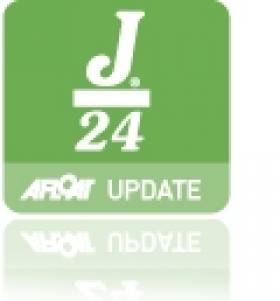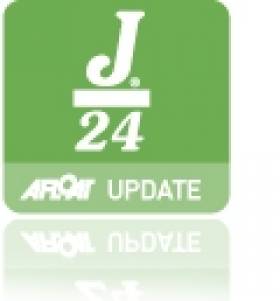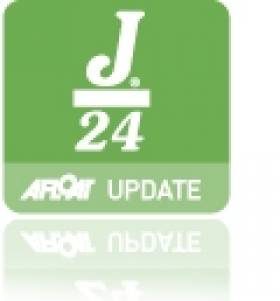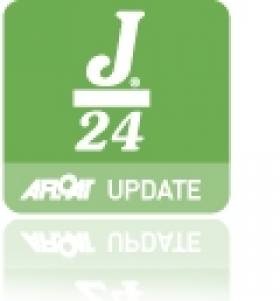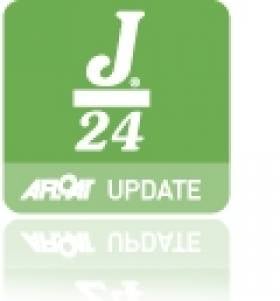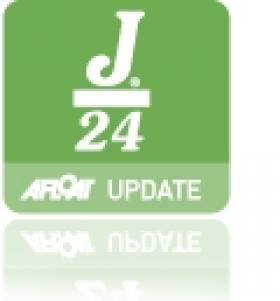Displaying items by tag: Flor O'Driscoll
Irish J24s Lie 14 & 16 in Strong Euro Fleet
#j24 – Royal St. George's Flor O'Driscoll is 14th after three races of the J24 Europeans in France this week. 16th is Howth Yacht Club's Kilcullen (Cillian Dickson in a fleet of 32 boats from seven European countries. France, Ireland, Hungary, Great Britain, Italy, Germany, Greece are participating at in Crouesty de Arzon,France including representatives from the USA and Brazil. What is all the more remarkable is that this year's fleet is one of the strongest fields in a number of years.
A top USA J/24 team from Rochester, New York – Mike Ingham and gang has reinforced a strong European field. Topping it all off with regards to talent and experience will surely be multiple World and South American Champion, Mauricio Santa Cruz sailing Bruschetta with partners King and Revore.
Top ten after 3 races
1. Mike Ingham, USA, 5 points
2. Duncan McCarthy, GBR, 6
3. Ignazio Bonanno, ITA, 19
4. Frank Schonfeldt, GER, 19
5. Anthimos Nicolaidis, GRE, 23
6. TIll Pomarius, GER, 24
7. Johann Huhn, GER, 26
8. Tom Stryi, GER, 27
9. Mark Karsunke, GER, 27
10. Francois De Herce, FRA, 27
Change of J24 Leader as Big Winds Sweep Through Lough Erne
#j24 – Day two of the Irish J24 National Championships made for a gruelling affair for the competitors as winds gusted above 25 for most of the racing day writes Andrew Carey.
With it brought a change to the leaderboard with Flor O'Driscoll's Hard On Port taking line honours in the first two races of day two.
Unfortunately for the leader after day one, JP McCaldin's Jamais Encore, retirement from race one due to a damaged rudder meant that running repairs were called for as the fleet raced on in race two, but tantamount to the resolve of the Lough Erne boat, JP and his crew returned to take line honours in the final two races of the day.
With heavy winds and squalls rolling in off the north western shores, the 12 crews took their punishment as the country's best J24 boats battled and vowed for the lead which changed throughout the tight racing.
With 6 races sailed, Hard On Port has the lead by three points over Stefan Hyde's Hamilton Bear and Jamais Encore and further eight points back.
With two races to sail on the last day, close racing will again be to the fore as the top boats battle it out for the national J24 title.
Results after 6 raced
Hard on Port Flor O'Driscoll RsGYC
Hamilton Bear Stefan Hyde RCYC
Jamais Encore JP McCaldin LEYC
Kilcullen Gordon Stirling HYC
Crazy Horse Tim Corcoran SYC
Countback needed to decide J24 Western Championship
O'Driscoll, the Corkman who sails out of the Royal St.George but is racing in Howth this season in preparation for the forthcoming BMW European Championships there in September, got off to the perfect start by winning the first race but was black-flagged in the second, when victory went to local boat 'Jeb' (Andrew Mannion) ahead of 'Jibberish'.
Heavy squalls in race 3 mixed things up again with Stefan Hyde/Declan MacManus's 'Kilcullen' taking the gun from local man Stan Bradbury in 'Javelin'. The fourth race was sailed in Force 5+ winds and with most boats opting for jibs, it was 'Jeb' who took the honours and so lead overnight.
On the second day, Mickey McCaldin's 'Murder Picture' from Lough Erne won race 5 from 'Jibberish', a result that meant any of the top six could win the event going into the final race. O'Driscoll and crew held their nerve to beat O'Kelly et al to the line, leaving the two tied on points after the discard.
On countback, two race wins was enough to give the edge to 'Hard on Port' and 'Jeb' finishing third. Three points separated the top five points, illustrating the closeness of competition in this one-design keelboat class.
J24 Western Championships at Lough Ree YC - Results:
Hard on Port Flor O'Driscoll (RStGYC/HYC) 14ptsJibberish Fergus O'Kelly et al (HYC) 14 ptsJeb Andrew Mannion (LRYC) 16 ptsJavelin Stan Bradbury (LRYC) 16 ptsKilcullen Hyde/MacManus (RCYC/HYC) 17 pts
Masterclass by O'Driscoll earns J/24 national title
An exhibition of how to win sailing races on the second day of the Irish J/24 Championships at Howth saw Flor O'Driscoll and his crew from the Royal St.George YC on 'Hard on Port' deservedly win the national title he has craved for several years, by the impressive margin of 19 points.
Three bullets on day two, including one which required coming from behind to outfox former champion Stefan Hyde by the final leeward mark, was sufficient to give the pre-event favourite the championship. O'Driscoll's cause was certainly helped when overnight leader and defending champion Mickey McCaldin on 'Murder Picture' (LEYC) was one of five boats 'black-flagged' on the first race start after PRO David Lovegrove imposed the penalty following a couple of general recalls.
That effectively ended the Ulster crew's challenge and it was followed by two other poor results which ultimately dropped them to 6th overall. The black flag decision also had a significant impact on other overall results, with another Lough Erne entry, Diarmuid O'Donovan's 'Sayonara' jumping four places to earn the runners-up spot, thanks to two second places and an 8th. It was enough to edge past clubmate and J/24 Class President Robin Eagleson who wasn't as effective as on the first day but did more enough to justify 3rd overall and also first in the silver fleet for the older boats.
Howth's 'Jibberish' (Fergus O'Kelly et al) was more than pleased with 4th overall, just one point away from a podium finish, an encouraging performance considering the crew did not have the benefit of a full season's practice as a result of serious collision damage back in June. One point further back was Andrew Mannion's 'Jeb Stuart', with three top six places on the second day lifting the Lough Ree boat two places in the overall standings.
That four points separated second from fifth places overall indicates the closeness of one-design racing while Gordon Davies on the Jury Boat was kept busy over the two days maintaining rule observation on the water. The full 8-race schedule was completed, generally in fresh westerlies, with the race management team complemented on their performance over both days, when strong tides were a significant factor.
The 17-boat fleet, one of the biggest J/24 fleets in recent years, augurs well for the J/24 Europeans at Howth next year, with around eight nations already confirming their intention to compete.
J/24 National Championship – final results after 8 races:
1. Hard on Port – Flor O'Driscoll (RStGYC) 13 points
2. Sayonara – Diarmuid O'Donovan (LEYC) 32 points
3. Luder Too – Robin Eagleson (LEYC) 34 points
4. Jibberish – Fergus O'Kelly (HYC) 35 points
5. Jeb Stuart – Andrew Mannion 36 points
6. Murder Picture – Mickey McCaldin (LEYC) 44 points
McCaldin Defending Title in Style
His championship defence couldn't have started any better, with three successive bullets. The fourth race was something of a disaster for them finishing 14th but 5th in the final race of the first day sees them two points clear of their major rival for the honours, Flor O'Driscoll (RSt.GYC) on 'Hard on Port' who notched up three third places and a win the final race to stay very much in touch with the defending champion.
Local hopes centre on 'Jibberish' (O'Kelly & Co) and they did not disappoint. Having only taken delivery of the boat two days ago after repairs to serious damage suffered months ago in a T-bone collision, they might be excused for not performing, as they got re-0acquainted with their boat. A results card that included two second places and the most impressive race win of the day – the margin of victory was very impressive – puts the Howth crew in third place overall going into the second day.
Tying on points but ranked as 4th is J/24 Class President Robin Eagleson of Lough Erne YC on 'Luder Too' who also showed great consistency with three second places and might have ended the day even higher up the leader-board if it wasn't for a disastrous last race when the tides played havoc with the distinctively red boat at the windward mark.
Two other northern boats – JP McCaldin's 'Jamais Encore' (Dalgety Bay SC) and 'Sayonara' (D.O'Donovan, LEYC) – fill the next two places overall.
The five windward-leeward races were sailed in varying (although generally fresh) conditions, with headsail changes the order of the day, while the last race threw up gusts of 30 knots plus at the 17-boat fleet. The series concludes on Sunday 12th with three races scheduled by PRO David Lovegrove and his team on 'Free Enterprise'.
J/24 National Championship – overall places after 5 races:
Mickey McCaldin – LEYC – 8 points
Flor O'Driscoll – RStGYC – 10 points
Fergus O'Kelly & Co. – HYC – 14 points
Robin Eagleson – LEYC – 14 points
J.P. McCaldin (DBSC) – 20 points
D.O'Donovan – LEYC – 20 points
Photo Gallery by Gareth Craig HERE
O'Driscoll tipped for J/24 Nationals title
After the Etchells Worlds and SB3 Nationals in successive weeks, Howth Yacht Club's championship trilogy concludes this weekend with the J/24 National Championship which is expected to attract up to 18 entries from half a dozen clubs for the 8-race series.
The out-and-out favourite for the title is Flor O'Driscoll and his crew on 'Hard on Port' from the Royal St.George YC who have dominated the class this year, with comfortable wins in the Western and Northern Championships already. In addition, second place in Class 3 in the ICRA Nationals behind a very fast quarter-tonner is a clear indication of how well the boat is being sailed this season.
Defending champions are the veteran crew on Mickey McCaldin's 'Murder Picture' from Lough Erne YC while the younger McCaldin, JP, will hope to improve on his 2nd place on 'Jamais Encore' at last month's Northerns on home waters.
Lough Ree YC supplies a number of entries and the leading contender from the Shannon region is likely to be Stan Bradbury on 'Javlin' who sailed well at Lough Erne but lost out with two OCS infringements.
The north Dublin challenge could be led by Brian McDowell's 'Scandal' from Malahide while the host club's Fergus O'Kelly returns to action after repairs to 'Jibberish' following a serious collision before the Lambay Race back in June.
With HYC hosting the J/24 European Championships next year, this weekend's event is an ideal opportunity for the inland lake sailors in particular to familiarise themselves with Howth's tidal conditions.


























